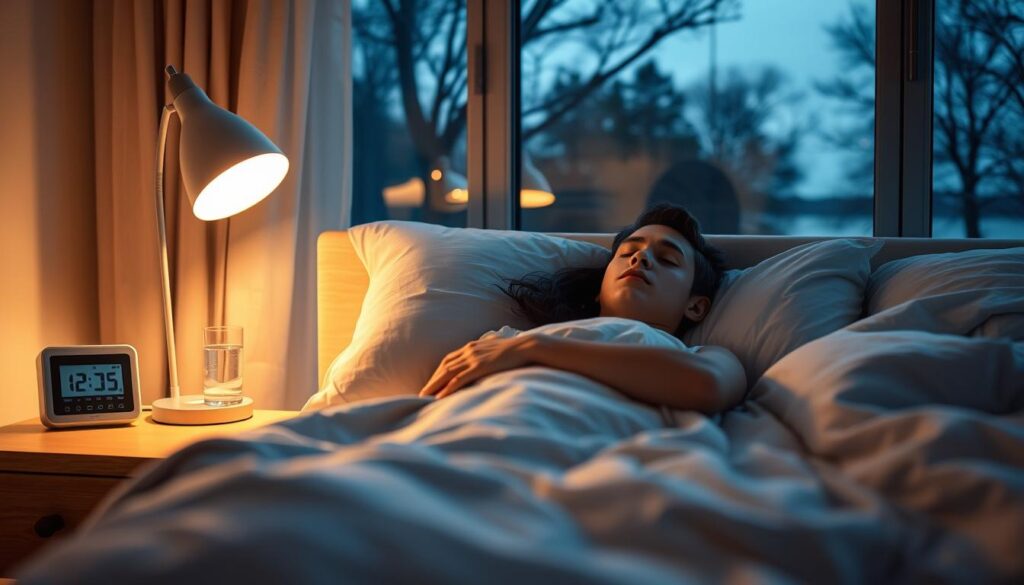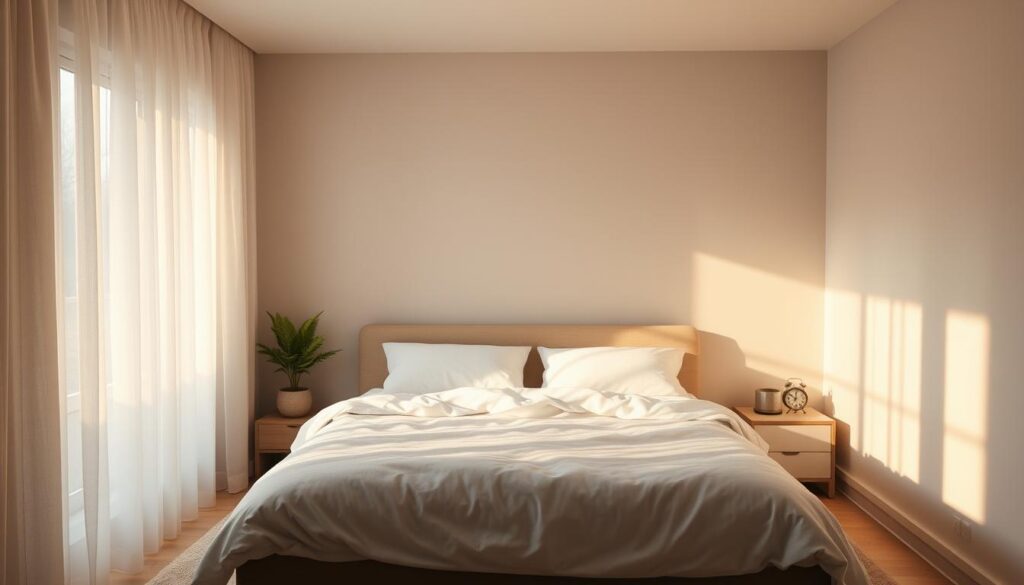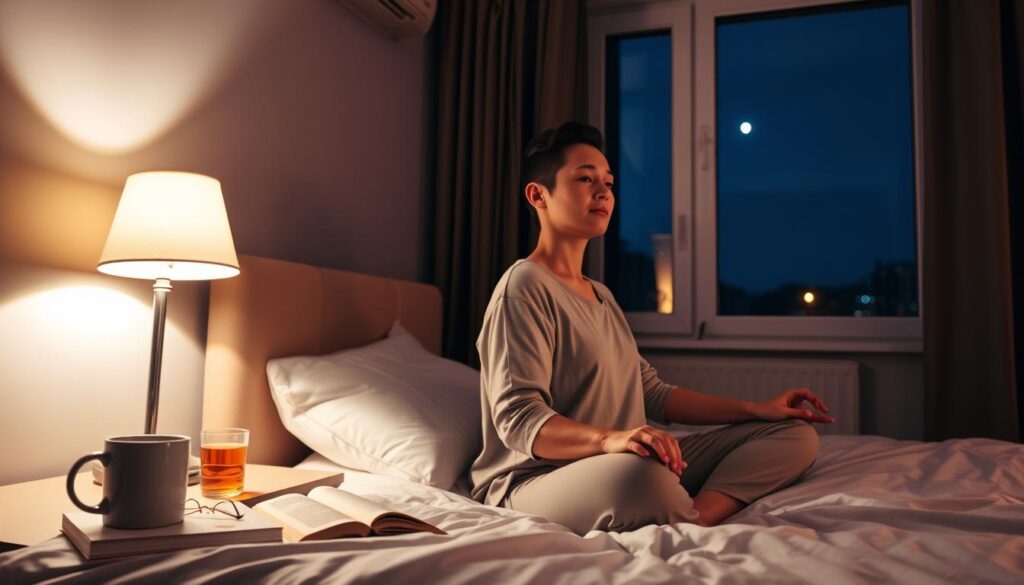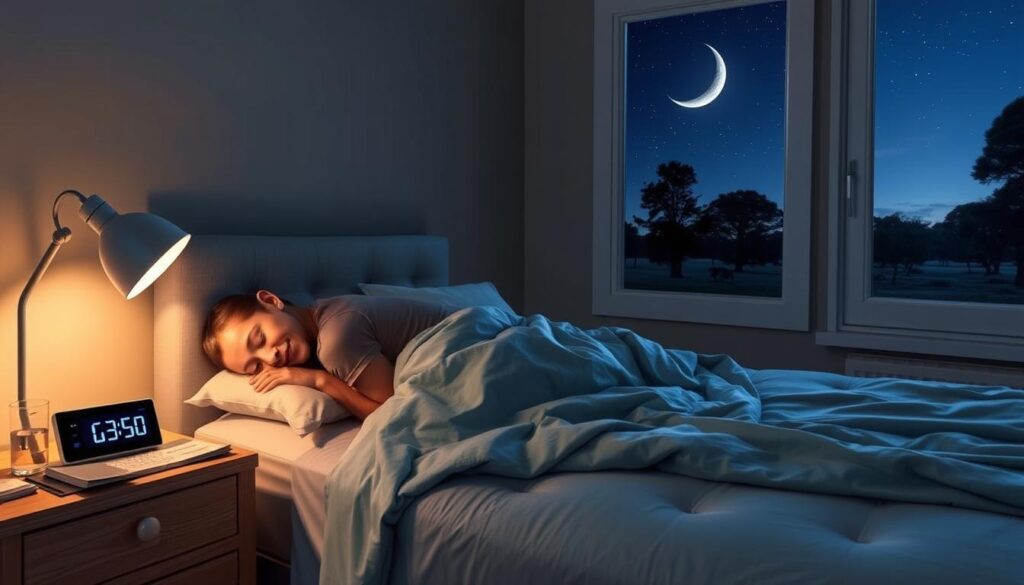Nearly one-third of the population suffers from poor sleep quality, with chronic sleep issues linked to serious health conditions. Optimizing sleep is crucial for overall wellbeing, impacting physical, mental, and emotional health.
Improving sleep habits and utilizing modern sleep tracking technologies can significantly enhance quality sleep. This comprehensive guide explores evidence-based strategies for sleep hygiene practices and consistent routines to boost overall health.
By understanding the science behind sleep and implementing actionable steps, individuals can transform their sleep quality, leading to better mental clarity, a healthier weight, and a reduced risk of chronic diseases.
The Science of Sleep and Why It Matters
Understanding the science behind sleep is crucial for appreciating its impact on our overall health. Sleep is not just a passive state of rest; it’s a dynamic process that involves multiple stages and cycles, each playing a critical role in our physical and mental rejuvenation.
Understanding Sleep Cycles and Stages
Sleep follows a complex pattern of cycles and stages, including light sleep, deep sleep, and REM (rapid eye movement) sleep. Each stage serves distinct biological functions that support physical restoration, memory consolidation, and cognitive processing. A full sleep cycle typically lasts around 90-110 minutes, with multiple cycles occurring throughout the night.

The Health Consequences of Poor Sleep
Research consistently shows that chronic sleep deprivation significantly impacts both physical and mental health, increasing the risk of cardiovascular disease, weakened immunity, weight gain, and cognitive impairment. Ensuring adequate sleep quality and duration is essential for maintaining overall health.
| Sleep Stage | Characteristics | Functions |
|---|---|---|
| Light Sleep | Easily awakened, slower brain waves | Transition to deeper sleep stages |
| Deep Sleep | Difficulty awakening, slow brain waves | Physical restoration, tissue repair |
| REM Sleep | Rapid eye movements, vivid dreams | Memory consolidation, cognitive processing |
By understanding sleep cycles and stages, we can appreciate the importance of both sleep quantity and quality for our overall well-being. Disruptions to certain sleep stages can leave us feeling unrested, even after a full night’s sleep.
The Foundations of Sleep Hygiene
The practice of sleep hygiene is becoming increasingly recognized as a key factor in improving sleep quality. By adopting consistent sleep habits and optimizing one’s sleep environment, individuals can significantly enhance the restorative value of their sleep.
What Is Sleep Hygiene?
Sleep hygiene refers to the practices and habits that help promote consistent, uninterrupted, and restorative sleep patterns. It encompasses a range of activities, including maintaining a consistent sleep schedule, creating a sleep-conducive environment, and avoiding stimulating activities before bedtime.
How Sleep Hygiene Affects Your Overall Health
Good sleep hygiene has a profound impact on overall health, influencing not just sleep quality but also daytime energy levels, cognitive function, and emotional regulation. By prioritizing sleep hygiene, individuals can mitigate the risk of sleep disorders and related health issues.

The Relationship Between Sleep Quality and Quantity
While the quantity of sleep is important, sleep quality plays a critical role in determining the restorative value of sleep. Factors such as sleep fragmentation, sleep disorders, and environmental disruptions can significantly impact sleep quality, highlighting the need for a comprehensive approach to sleep hygiene.
By understanding and implementing good sleep hygiene practices, individuals can take a proactive approach to improving sleep and overall well-being.
Creating Your Optimal Sleep Environment
Crafting a sleep-conducive environment is crucial for improving the quality of your sleep. Your bedroom should be a sanctuary that promotes relaxation and prepares your body for restful sleep.
Temperature, Light, and Noise Control
Controlling temperature, light, and noise levels in your bedroom is vital for creating an ideal sleep environment. A cool room temperature between 65-68°F (18-20°C) is considered optimal for sleep. Light exposure, particularly blue light from screens and bright overhead lighting, can suppress melatonin production, disrupting your circadian rhythms. Using blackout curtains, dimmer switches, or screen filters can help mitigate this issue. Additionally, noise disruptions can fragment your sleep cycles; consider using earplugs or white noise machines to mask disruptive sounds.

Selecting the Right Mattress and Bedding
Your mattress and bedding choices play a significant role in determining the quality of your sleep. A comfortable bed with the right firmness and breathable materials can facilitate relaxation and optimize sleep. It’s essential to choose a mattress that supports proper spinal alignment and regulates temperature effectively.
Bedroom Organization for Better Sleep
A clutter-free and calming bedroom environment can help reduce cognitive stimulation and anxiety, making it easier to wind down before sleep. Organizing your bedroom to promote relaxation involves minimizing clutter, using soothing colors, and creating a peaceful ambiance that fosters better sleep and overall well-being.
Developing a Consistent Sleep Schedule
One of the most effective ways to enhance sleep quality is by developing a consistent sleep schedule. This involves setting a regular sleep and wake time, which aligns with the body’s natural circadian rhythms and reinforces the internal body clock.
Fixed Sleep and Wake Times
Setting fixed sleep and wake times is crucial for maintaining a consistent sleep schedule. Try to go to bed at the same time each night and wake up at the same time every morning, including weekends. This consistency helps regulate the body’s internal clock and improves the quality of sleep.
| Benefits | Description |
|---|---|
| Regulated Melatonin Production | Maintaining regular sleep and wake times helps regulate melatonin production, leading to better sleep quality. |
| Improved Sleep Onset | A consistent sleep schedule helps the body get into a routine, making it easier to fall asleep. |
| Enhanced Wakefulness | Waking up at the same time every day helps regulate the body’s circadian rhythms, leading to improved alertness during the day. |
The Role of Natural Light
Morning exposure to natural sunlight plays a significant role in regulating the body’s circadian rhythm. Spending at least 30 minutes outside in the morning helps signal to the brain that it’s time to be alert, setting the stage for proper melatonin release later in the evening.

Managing Naps Effectively
Strategic napping can supplement nighttime sleep when necessary. However, naps should be limited to 20-30 minutes and taken before 3 PM to avoid interfering with nighttime sleep. This approach helps maintain a consistent sleep schedule while providing rest when needed.
By prioritizing a consistent sleep schedule and creating an environment conducive to sleep, individuals can significantly improve their sleep quality and overall health.
Creating an Effective Bedtime Routine
Crafting a bedtime routine tailored to your needs can revolutionize your sleep. A consistent bedtime routine serves as a powerful signal to your brain that it’s time to wind down, triggering the natural transition from wakefulness to sleep and improving both sleep onset and quality.

The 10-3-2-1-0 Rule for Better Sleep
The 10-3-2-1-0 rule provides a structured framework for optimizing the hours leading up to bedtime. This rule suggests eliminating caffeine 10 hours before sleep, cutting alcohol 3 hours before bed, stopping work 2 hours before bed, avoiding screens 1 hour before bed, and hitting ‘snooze’ 0 times in the morning. By following this rule, individuals can significantly improve their sleep hygiene.
| Time Before Bed | Activity to Avoid | Benefit |
|---|---|---|
| 10 hours | Caffeine | Improves sleep quality |
| 3 hours | Alcohol | Reduces sleep disruptions |
| 2 hours | Work | Enhances relaxation |
| 1 hour | Screens | Promotes melatonin production |
| 0 times | Hitting snooze | Improves morning routine |
Relaxation Techniques to Prepare for Sleep
Effective relaxation techniques are crucial for preparing the mind and body for sleep. Techniques such as progressive muscle relaxation, deep breathing exercises, gentle stretching, meditation, and guided imagery can significantly reduce sleep latency and improve overall sleep efficiency. Consistency is key; performing the same relaxation activities in the same order each night creates powerful associations that strengthen over time, eventually triggering automatic relaxation responses.
Temperature regulation also plays a vital role in bedtime routines. A warm bath or shower 1-2 hours before bed causes a subsequent drop in body temperature, mimicking the natural temperature decline that occurs during sleep onset. This can be a valuable addition to a bedtime routine.
Diet and Substances That Impact Sleep Quality
Our daily intake of food and beverages has a profound impact on our ability to fall asleep and stay asleep. The timing and composition of our meals can either support or disrupt our sleep patterns.
Timing Your Food and Drink Intake
Eating heavy meals within three hours of bedtime can cause digestive discomfort and acid reflux, making it harder to fall asleep. On the other hand, going to bed hungry can trigger wakefulness due to dropping blood sugar levels. It’s essential to strike a balance and time your meals appropriately.
Caffeine, Alcohol, and Nicotine Effects on Sleep
Caffeine has a half-life of 5-7 hours, meaning that consuming it in the afternoon can still affect your system at bedtime. Limiting caffeine to morning hours can improve sleep quality. Alcohol may induce drowsiness initially but disrupts normal sleep architecture, leading to less restorative sleep. Nicotine, found in cigarettes, can also make it difficult to fall asleep.

Foods That Promote Better Sleep Habits
Certain foods naturally support sleep by providing precursors to sleep-regulating hormones. Tryptophan-rich foods like turkey, eggs, and cheese, magnesium-rich foods such as nuts, seeds, and leafy greens, and complex carbohydrates can promote better sleep habits.
| Food | Nutrient | Benefit |
|---|---|---|
| Turkey, Eggs, Cheese | Tryptophan | Promotes serotonin production |
| Nuts, Seeds, Leafy Greens | Magnesium | Relaxes muscles and promotes sleep |
| Whole Grains | Complex Carbohydrates | Helps tryptophan cross the blood-brain barrier |
Maintaining a balanced diet and being mindful of the substances we consume can significantly improve sleep quality and overall health.
Sleep Tracking: Understanding Your Sleep Patterns
![]()
Effective sleep tracking can reveal valuable insights into your sleep habits. By understanding your sleep patterns, you can identify areas for improvement and make targeted changes to enhance your sleep quality.
Sleep Journals vs. Technology-Based Tracking
Sleep tracking methods vary from traditional sleep journals to advanced wearable devices and bedside monitors. While technology-based tracking provides precise measurements of sleep duration and architecture, sleep journals capture contextual factors like stress levels, diet, and subjective sleep quality.
The most effective approach often combines both methods—using technology for objective measurements while maintaining a sleep journal to identify behavioral and environmental patterns that affect your sleep quality.
How to Interpret Your Sleep Data
When interpreting sleep data, focus on trends rather than individual nights. Look for patterns that correlate with lifestyle factors you can modify, rather than becoming fixated on achieving “perfect” sleep metrics.
Common metrics to monitor include sleep onset latency, sleep efficiency, wake episodes, and estimated time in different sleep stages. These metrics provide different insights into your sleep quality.
Using Sleep Tracking to Improve Sleep Habits
Using tracking data effectively involves making one targeted change at a time based on your findings, then monitoring the results over 1-2 weeks before making additional adjustments.
By leveraging sleep tracking data, you can develop better sleep habits and improve your overall sleep quality. This data-driven approach helps you make informed decisions about your sleep hygiene practices.
Sleep tracking provides objective insights into sleep patterns, helping you identify specific areas for improvement. With the right tools and approach, you can enhance your sleep quality and overall well-being.
Addressing Common Sleep Disruptors
Sleep disruptors can significantly impact the quality of our rest, making it essential to identify and address them. Various factors can interfere with our sleep, ranging from psychological issues to environmental factors.

Managing Stress and Anxiety for Better Sleep
Stress and anxiety are significant sleep disruptors, activating the body’s fight-or-flight response and making it difficult to relax. Techniques such as journaling, mindfulness meditation, or guided relaxation can help reduce anxiety before bedtime, promoting a restful night’s sleep.
Screen Time and Blue Light Exposure
Exposure to blue light from screens can suppress melatonin production, increasing alertness and delaying sleep onset. Limiting screen time within 1-2 hours of bedtime can help mitigate this effect, improving the ability to fall asleep.
What to Do When You Can’t Fall Asleep
If you’re unable to fall asleep within 20-30 minutes, it’s recommended to get out of bed and engage in a quiet, non-stimulating activity in dim light until you feel sleepy again. This helps prevent negative associations between your bed and wakefulness, ultimately improving sleep quality.
By addressing common sleep disruptors such as stress, screen time, and physical discomforts like snoring, individuals can take significant steps towards improving their sleep hygiene and overall health.
Conclusion: Building Sustainable Sleep Habits for Lifelong Health
Building sustainable sleep habits is key to achieving lifelong health benefits. By implementing the strategies outlined in this guide, you can significantly improve your sleep quality and overall health. It’s essential to remember that sleep hygiene is not a one-size-fits-all technique; it requires patience and persistence to find what works best for you.
As you work towards better sleep every day, focus on progress rather than perfection. Even modest improvements in sleep habits can yield significant health benefits. By making gradual changes and being consistent, you can develop healthy sleep habits that enhance your overall wellbeing.